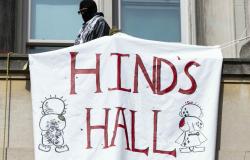On TV he made Matteo Salvini and Fedez cry. Now Francesca Fagnani arrives in the bookshop with an investigation into the Roman Mala: “I study the judicial documents with the same method I use to prepare the interviews with Belve”
Red notebook in hand and facial expressions instead of highlighter, to underline the interlocutor’s quirks, confessions and failures. For the Rai 2 audience, and for anyone who opens social media even just once a day, Francesca Fagnani is this: the journalist to whom Beasts everyone tells things that have never been said or explains things that are known better – photo | video
FIRST ONLY WOMEN – At first, the interviewees were only women, then men also arrived. And the men, at Fagnani, often cry: it happened to Matteo Salvini in the first episode of this new season, to Fedez in the second, but in the past Rocco Siffredi, Massimo Giletti, Antonio Conte had already dissolved into tears. «It happens when the interviewee allows you, and allows himself, to go in depth. Not everyone succeeds.”
Francesca Fagnani: “I don’t believe in love forever: I’m not a saint” – Look
FROM SANREMO TO THE FIRST NIGHT ON RAI OF BELVE – The human speleology practiced by Fagnani is so popular that within a few seasons the program moved from Nove to Rai 2 and from the second to prime time. With ratings that amazed, and a little scared, even the Roman journalist who co-hosted the Sanremo Festival last year: «Because of the way I am, I tend to be afraid of not being up to what’s available to me. happening. Faced with 10% audience figures, the temptation was to call Rai and say “Ok, it went well, let’s stop here”. The only reaction I have is anxiety that makes me work three times as hard. I have seen people much more important than me rise and fall rapidly and this always reminds me that “success”, after all, is a past participle.”
Simona Ventura to Belve: “I wish Jesus would come back to life”. It’s a pity that… – Look
Is success also a revenge on something or someone? «About nothing and no one. It comes after 20 years of apprenticeship, I experience it with joy and with my feet firmly on the ground.”
Heel 12 and feet on the ground, Fagnani has cultivated a deep interest in organized crime since the beginning of his career. He dedicated his first book to the Roman one, Mala – Criminal Rome, an investigation that seems like the script of a TV series, with dialogues extrapolated from wiretaps and interrogations, and characters that seem fake: “Instead, not only do they exist but they have the Capital in their hands.” It will be released on April 30th by Sem and here the journalist talks about it for the first time «Crime is the topic I have always worked on. The book is an important stage in this journey: when I wrote “end” I couldn’t close the file for a week. I couldn’t tear myself away. I worked on it for six months, studying an entire library of judicial documents.”
To Belve Fedez, Chiara Ferragni and the pandoro-gate: “It’s the fault of only one” – Look
How did you get started with it? «With Giovanni Minoli. The very first thing I did for him, in 2009, was 57 days in Palermo in which I recounted the days between the Capaci and Via D’Amelio massacres and in which I obtained the only interview ever given by Agnese, wife of judge Borsellino. I have always moved between investigation and interview, considering the interview a noble genre, often a little abandoned in favor of agreed-upon or promotional interviews.”
In Mala recounts the Roman underworld starting from the murder, on 19 July 2019, of Fabrizio Piscitelli, known as Diabolik, leader of the Irriducibili, the fans of Lazio’s northern curve, with serious precedents linked to drug trafficking. Because he decided to start from this murder? «I followed the investigations from day one, and I decided to make Piscitelli a sort of common thread in the story of that world because he sat at all the important tables of Roman crime. It was a good way to describe the major cliques that compose it: the ‘Ndrangheta, the Albanians, the Casamonica. There is a world in Rome that you have no perception of while living there. When the so-called Mafia Capitale investigation took place, much was said about the mixture of politics and business and corruption. Mine is another piece of the city’s story. It is as if there were an underground Rome dominated by narcos, which has its center in the suburbs but whose offshoots reach Parioli, in northern Rome. Contexts emerge that harken back to the times of the Magliana gang, with Mexican methods, including kidnappings, torture, hitmen, lots of blood. With enormous flows of money around drug trafficking and for which unsuspected violence breaks out.”
Which seems to fascinate her a lot. «I’ve been dealing with this for a long time. Crew in tow, I talked about the Roman and Neapolitan suburbs. In 2012 I was the one who brought out Casamonica on television, when for Public Service I managed to sneak into a raid by the police: the Digos thought I was with the Carabinieri, the Carabinieri thought I was following the Guardia di Finanza”.
Francesca Cipriani, the interview with Belve is a string of gaffes – Look
In the book he publishes many intercepted dialogues which are on record. Why? «It seemed to me the right way to describe the protagonists: through their own words. There was no need for mediation, they are incredible dialogues that reveal a world of double and triple games, of people who call themselves “the Supreme Court” or “ISIS” and women who call guns “my little girls”.
They say: “Rome doesn’t want leaders.” Does your reconstruction of the Capitoline crime confirm this? «In Rome there are indeed leaders, criminal figures who have ruled the city for 40 years. Like Michele Senese, at the top of a drug trafficking cartel in which very important figures have grown up. Or like Ciccio D’Agati, the Cosa Nostra’s representative in Rome for decades. In the book I try to reconstruct the organizational chart of this cartel, starting from the power war between two very strong criminal groups that broke out after Piscitelli’s death. Once he dies, the arrangements that guaranteed apparent peace collapse. Rome is a city that seems calm and never seems to change. But in his criminality things have changed a lot and quickly. The Albanian criminals of the capital, born as laborers at the service of other cliques, in twenty years have taken over half of Rome, are among the most powerful narcos in Europe, deal directly with the South American cartels, on a par with the ‘Ndrangheta, and have codes very similar to theirs. The Casamonicas, although now weakened by investigations and arrests, have grown into general underestimation.”
Why was Piscitelli killed? «It was annoying because he felt stronger and more autonomous than he was. He behaved like a king while the king in office is Sienese. He claimed to establish mafia relationships and alliances without having the qualifications. Even in that world you have to know how to behave. He died a free man, but there was an investigation into him which only when he died was able to reveal his real caliber.”
After his death a big shot of that ring, Fabrizio Capogna known as the Shark, decided to collaborate with the magistrates. Why is his repentance important? «He regretted it when he ended up in the middle of a war between two groups of Albanian narcos and risked his life. His repentance is a turning point because Capogna came from nothing, made a climb and knows all the dynamics and the organizational chart.”
From Belve Melissa Satta and the Berrettini crisis: “I am the scapegoat” – Look
In the book he also talks about meetings with bosses, including Ciccio D’Agata. Have you ever been afraid? «Not with them. Traveling around the suburbs, where it is very easy to risk being beaten up, I quickly learned to have a neutral, curious and above all non-judgmental approach. As a reporter. Which is how I behave with guests of Beasts».
Mala’s chapter on the day that changes the course of Piscitelli’s life was titled The Appointment, like the song by Ornella Vanoni that she chose as the theme song for Belve. What was the appointment that changed the course of your life? «The one with Michele Santoro, 15 years ago. I came from working with Minoli, but Santoro was my great opportunity, my university. First report, October 2010: documenting the peace between Gianni Alemanno and Umberto Bossi, the “pajata pact”. Then he sent me to follow the waste emergency in Naples.”
But is she the one from Belve or the one who in Mala meets mafia bosses on the outskirts of Rome? «Apart from the heel, which is a stage dress, there is no difference between the two “me”. Journalism takes different streams that have the method in common. I approach the study of the characters I interview with the same care with which I study the documents of a trial.”
He just did it with Fedez. We saw him move, break free. What impression did you have from this meeting? «It was a very long interview, a portrait to reconstruct his entire journey, even before Chiara. I saw a free Fedez, with great autonomy of thought. He gives the feeling of being in a phase of recovering his original self, he seems to be in a moment of very strong psychological freedom. And freedom, when you find it again, is always intoxicating. In interviews there are people who allow you to touch them deeply and others who leave you on the surface. Federico showed himself thoroughly because he is capable of analyzing himself, looking at himself from the outside with a certain objectivity. He’s not for everyone.”
Matteo Salvini also cried. What if he was expecting it? «A little yes, and they were genuine tears. It often happens on that final question: “If he could bring someone back to life and tell them something who would he be and what would he say to them?”. It’s a question I always ask because I asked myself it first.”
You lost your mother in 2015. Would you be included in your answer to this final question? “Always. She and Aunt Lella, the nanny who first raised her and for a while me too. I would like to apologize to Aunt Lella for certain cruel stupid things that children do. I would like to be able to tell my mom that I love her. I didn’t tell him enough. And I would like to apologize for the time not dedicated; when you’re young you don’t think about it.”
Do you mind that I’m not here to see you collect so many accolades? «He was able to see my professional satisfaction: when no one knew me I was already doing what I liked and for this reason I already felt successful. Compared to then, only visibility has been added. I like it, but I’m not addicted to it: before and after the Belve season I disappear from TV.”
The first piece of advice you look for when faced with a decision to make? «My father’s. During Sanremo I even called him during the commercials. His is the look of someone who loves you and will always tell you the truth only in your interest.”
Francesca Fagnani: “Me, Enrico Mentana and that first kiss in the elevator” – Look
She has been Enrico Mentana’s partner for 12 years. Did this benefit you more or create more problems for you? «Neither of those things. Rather, it amazes me that the question about him comes up in every interview with me and never one about me in interviews with him. It’s a cultural legacy: female journalists are asked about their private life, but male editors are not.”
Would you ever let Fagnani interview you? «Yes, I think I would have a lot of fun. And that I would be sincere.”
Marianna Aprile
Today © ALL RIGHTS RESERVED
Tags: Francesca Fagnani interviews VIPs book Roman underworld






